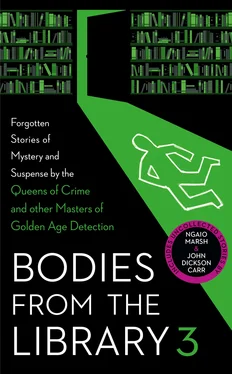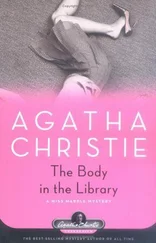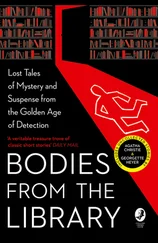1 ...8 9 10 12 13 14 ...19 ROGERS: Stop that woman!
( Sound of door slamming. Then sound of trying to open door )
She’s locked the door! Where does this lead to?
BRIGGS: The gun-room. I’ll go round the other way.
( Sound of door opening and closing )
ROGERS: Open this door!
( Sound of trying to open door )
Open this door!
( A loud explosion from outside. A pause. Then the sound of door being unlocked )
BRIGGS: I was too late, Mr Rogers. Mrs Barrett has shot herself.
JULIUS: I don’t understand. Do you mean that Mrs Barrett—?
ROGERS: Mrs Barrett, sir, was the murderer of Robert Warbeck.
JULIUS: I can’t believe it. Mrs Barrett? She had no grudge against him, surely?
ROGERS: Not against him, sir, but against you.
JULIUS: Against me? I still don’t follow.
ROGERS: Until a few moments ago, sir, you believed yourself to be Lord Warbeck’s heir, did you not?
JULIUS: Yes, I did.
ROGERS: And likely to succeed to the title at any moment?
JULIUS: Quite.
ROGERS: I don’t think you looked forward to the prospect of going to the House of Lords?
JULIUS: I should think not. It would have meant my resigning my post in the Government.
ROGERS: Because the Chancellor of the Exchequer must be a member of the House of Commons, is that not so?
JULIUS: Of course. Everybody knows that.
ROGERS: I don’t know about everybody, sir, but Mrs Barrett certainly did. And if you were compelled to resign, who would succeed you in the Chancellorship, do you suppose, sir?
JULIUS: Why, of course—it would be Barrett! There’s no question of that.
ROGERS: Exactly, sir. And Mrs Barrett was a woman who was prepared to do anything to further her husband’s career. She chose this way to clear the obstacle which you presented from his path, by sending you to the House of Lords against your will. When you were so anxious to telephone to the Prime Minister just now, I suddenly saw what her motive was. But I had reason to think that unknown to either of you Mr Warbeck had left a son, so that in fact you were not the next heir to the peerage.
JULIUS: Oh, and what made you think that?
ROGERS: Well, sir, there are advantages to a detective living in the servants’ hall, you know, sir. I ascertained the truth from Mr Briggs and arranged with him to confront Mrs Barrett with the child. I thought that when she realised that her crime had failed in its purpose she would give herself away—and so she did, with a vengeance.
CAMILLA: Poor woman, poor woman!
SUSAN: Ah, it’s easy to say that of her , my lady, but it’s those that are left behind that need pity most, I think.
CAMILLA: ( reflectively ) Those that are left behind … ( impulsively ) Susan, I’d like to come and see your baby, if I may.
SUSAN: You’re welcome, my lady. He’s ever so sweet, and just like his father.
JULIUS: Take great care of that child, young woman! Why, my whole political career depends on him!
Best known to readers of detective fiction under the pseudonym ‘Cyril Hare’, Alfred Alexander Gordon Clark was born in 1900 in southern England. For around thirty years he led what might be described as a double life: as a highly respected lawyer; and as the author of nine superb novel-length detective mysteries as well as many criminous short stories.
Gordon Clark’s legal career followed broadly conventional lines. He became a barrister in 1924 and practised on civil and criminal cases. During the Second World War he joined the Public Prosecutions Department and in later years served as a County Court Judge in Surrey, the county of his birth. Gordon Clark’s first novel, Tenant for Death (1937), featured the Scotland Yard detective Inspector Mallett, while his fourth, Tragedy at Law (1942), introduced Francis Pettigrew, an ageing barrister who is based at least in part on Clark himself. Mallett and Pettigrew appear in several novels together but also tackle mysteries independently. While it features neither Mallett nor Pettigrew, one of Gordon Clark’s best books is the elegiac An English Murder (1951), which was derived from the radio play, ‘The Murder at Warbeck Hall’. Gordon Clark died in 1957.
The Murder at Warbeck Hall was first broadcast on the BBC Light Programme on 27 January 1948 as the second in a series of plays specially written for the BBC by Agatha Christie, Anthony Gilbert and other members of the Detection Club, which ‘Cyril Hare’ had joined in 1946. This is its first publication.
THE HOUSE OF THE POPLARS
Dorothy L. Sayers
Adrian Belford, emerging from the offices of Messrs Golding & Moss, Financiers, hesitated uncertainly at the corner of Conduit Street and Bond Street. There was a heavy coldness at the pit of his stomach, and his tongue felt dry. He had, indeed, succeeded in getting the loan renewed, but for one month only, and at what a cost! He could see now Mr Golding’s deprecatory smile, the spreading of his plump fingers with their heavy rings that winked in the lamplight. He heard himself saying, with an effort at easy bravado, ‘It is good security, Mr Golding’; heard the smooth, thick sibilants of Mr Golding’s reply: ‘No thecurity ith abtholutely thound, Mithter Belford that dependth upon a lady’th caprithe—eh?’ The swine!
If ever a fool, thought Mr Belford, had been called upon to pay heavily for his follies, he was that fool. There was his marriage to a plain and peevish invalid, far older than himself—only to find that the narrow hands whose clammy limpness had always displeased him could cling like limpets where money was concerned. Then there was that first unfortunate speculation in Megatherium Stock; then the long series of disasters attending his desperate efforts to recoup his losses; finally, the incredible suicide of mad Lord Ingleborough, whom everybody had expected to go lingering on for ever in his luxurious asylum. In two months’ time the new Lord Ingleborough would be of age and would demand an account of the trust funds. In two months—
His limbs felt leaden, like those of a swimmer climbing out of deep water. Bond Street, with its close ranks of packed and palpitating traffic, roared in his ears, beat in his face, buffeted him. Men and women jostled upon the pavement, hurrying past him, pressing upon him. The glare of shop windows, a little diffused by the light October mist, was a cruelty to his eyeballs. Nothing was real. He, with his sick apprehensions, was the only living and suffering thing in a puppet show of painted masks and jerking movements and noise. He shrank back and shot his hunted glance to left and right of him. It was then that he noticed the restaurant.
It stood on the opposite side of Conduit Street, almost directly opposite the money-lender’s premises. It was small and unpretentious, the lower half of its window discreetly veiled by a lace curtain, against which hung a framed menu. The upper half bore the legends: ‘SANDWICH BAR—COCKTAIL BAR’, silhouetted against the light within. Over the door hung a sign, bearing the single word ‘Rapallo’s’.
He glanced at his watch; it was a quarter to six. He had been over an hour screwing concessions out of the money-lender. Like an automaton he crossed Conduit Street and plunged into the restaurant. The door yielded easily to his touch and fell to behind him with a chuckling click. The place was suffocatingly warm, but it was quiet and almost deserted. A couple here and there sat eating American sandwiches at small tables. Occupying nearly half the available floor space was a vast semi-circular bar, gleaming with polished brass and mahogany. Behind it moved two barmen on soundless feet, taking down bottles from the glittering shelves, measuring, pouring, shaking. The lower murmur of conversation from the tables was punctuated by the musical tinkling of ice. Belford marched heavily up to the bar and demanded a large brandy and soda.
Читать дальше











